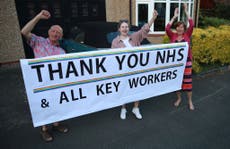Almost a third of women in frontline roles forced to go into savings to ‘manage financial difficulties in pandemic’
‘The past year in the job has been harder than doing a tour in Afghanistan. It’s mentally hard,’ says ambulance care assistant

Almost a third of women working in frontline roles during the Covid crisis have been forced to go into their savings to manage financial difficulties, a study has found.
The report, carried out by Unison, discovered women employed in key worker roles are forking out more on household bills during the pandemic, with almost half seeing their spending rise.
The increased living costs related to spending more on energy, food, technology and transport, with reasons cited including having to care for children at home due to school closures, and having a partner who was either furloughed or working from home.
Respondents were in “desperate” situations, with some having to cover the cost of all their bills after a partner had died from coronavirus, and others using blankets to fight back the cold as they can’t afford their electricity bills, researchers added.
The trade union, which polled almost 47,000 women, looked at the psychological, physical and financial repercussions of the emergency on women who have helped keep the UK going amid the upheaval Covid-19 has caused.
Almost two thirds of women said they were struggling to sleep properly, while around half said they were not taking regular breaks. Almost six in ten told researchers they felt stressed the majority of the time.
Charlene Smith, an ambulance worker who lives in West Yorkshire, told The Independent: “For everyone working on the frontline, the cost of living has gone through the roof, because we need to maintain hygiene and protect ourself, our families and others against the virus.
“We’re still earning same wage. We’re not millionaires. Coming home to my family after dealing with Covid all day, I worry I am going to infect them. My children’s friends are at home rather than school. So my children say: ‘Mummy, why are we at school? It is dangerous’.”
The 32-year-old, whose children are able to attend a school that has remained open for key workers, said she is spending a great deal more money on shampoo and conditioner due to having to wash her hair every day to ensure she does not inadvertently pass Covid-19 on to her family.
“I wash it every day to keep Covid away,” Ms Smith added. “Covid might be lingering about. It sounds pathetic but shampoo and conditioner is not cheap. Also, we wear masks and visors so our faces take a hammering and it takes all sorts of face creams and masks to stop my face being so sore.”
The mother-of-three, who has worked as an ambulance care assistant for seven years and earns £21,000 a year before tax, said she was also buying additional laundry detergent to clean her clothes, as well as spending more on household bills due to the family being at home more frequently than they were before the crisis.
She added she feels guilty every time she spends money, and that the pandemic has made her realise life is “fragile” and people need to “look after each other”.
Researchers polled teaching assistants, nurses, council workers, police staff, and carers, and found almost two thirds of parents they approached were anxious about their children’s mental health. Almost half said they had fears about the impact the pandemic is having on their education.
One woman polled said they had purchased a caravan to live in to keep vulnerable family members at risk of severe complications from Covid safe.
Helen Abbott, a teaching assistant at a school for children with special educational needs who lives near Preston, told The Independent she had been thrust into financial difficulty due to all three of her adult children moving home to live with her after losing their jobs as a result of the pandemic.
The 57-year-old said: “They are all graduates. I have had to use savings to support my children. We don’t have any luxuries because of Covid. I’m very careful with money. If it is not an everyday essential, we don’t have it.”
Ms Abbott added she was effectively the main carer for her eldest son, who has Asperger syndrome and has been turned down for a number of jobs leaving him feeling “very demoralised”.
Almost 25,000 women who participated in the poll, roughly half of respondents, earned £18,000 a year or less, while a third had a yearly wage of £15,000 or less.
An ambulance care assistant, who did not want to be named, said: “I was in the military and got paid danger money. In this job I’m risking my life every day for £10.94 an hour. The past year in the job has been harder than doing a tour in Afghanistan. It’s mentally hard.”
A police support officer, who also did not wish to be named, said life is a “constant juggling act”.
She added: “I’ve started suffering with anxiety. I’ve found it really hard to be out in the public, with people approaching me all day. We have masks, but many members of the public don’t wear them or respect social distancing.
“Lots of people tell me, ‘I don’t believe in it’ or ‘it’s not real’. It’s tough at home too. I have two teenagers. My food bills are significantly higher as the kids are home all day and they’re bored so they’re eating more. I have no time to myself, whether it’s at work or at home, I feel I’m always ‘on’. I’m doing shift work, then cleaning and looking after the children, then it all starts again.”
Unison has urged the government to make sure employers give staff greater flexibility over their hours, as well as making childcare more affordable and accessible for those working on the frontline, and keeping the £20 increase to the universal credit allowance in place.
Christina McAnea, Unison’s general secretary, said: “Public services would have come to a standstill without the vital jobs done by women in our schools, hospitals, police forces and local councils.
“But employees are exhausted. They’re worn out from meeting work demands during Covid while caring for relatives, looking after children and dealing with debt. Those on low wages are the ones shouldering these burdens most of all.
“All women deserve better and this country’s economic recovery depends on them. But their mental and physical health is at stake. The government needs to step up by providing the funding and support to make their working lives easier.”


.jpg?quality=75&width=230&auto=webp)

Join our commenting forum
Join thought-provoking conversations, follow other Independent readers and see their replies
Comments